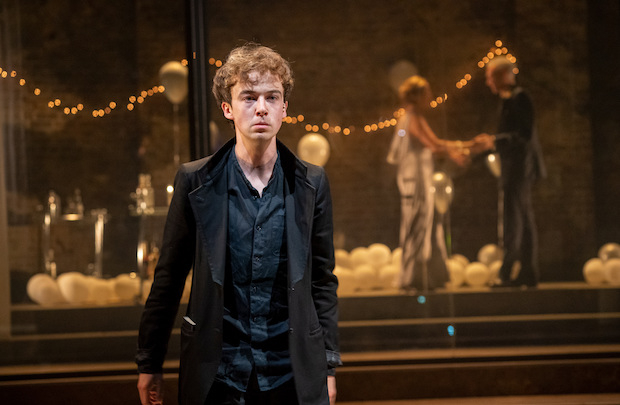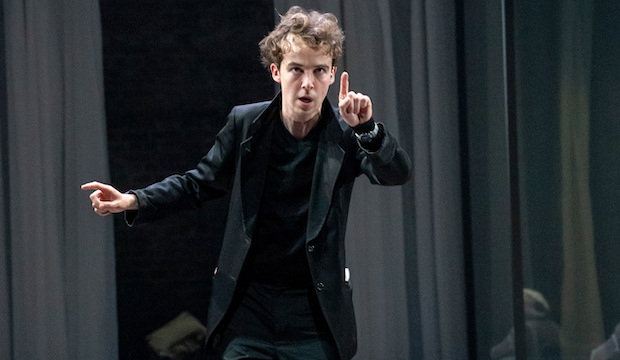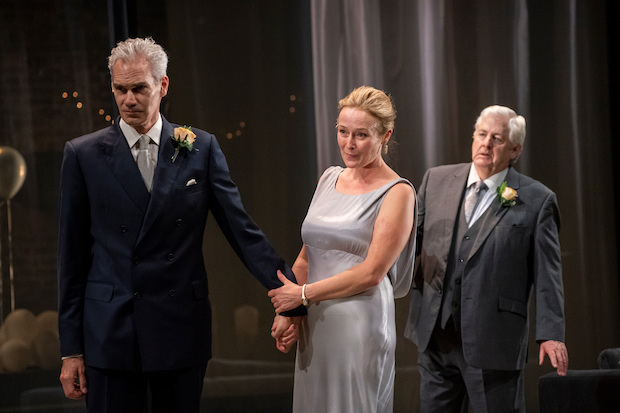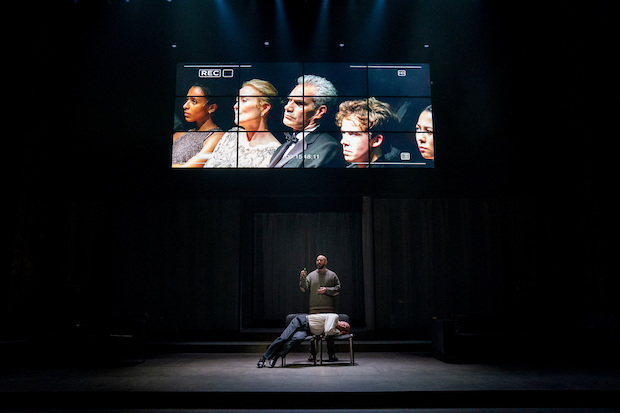Review: Robert Icke's Hamlet Is Simultaneously Innovative and Too Predictable
Alex Lawther stars as the Prince of Denmark in this acclaimed production from London.

(© Stephanie Berger)
You've never seen a Hamlet like this, and there's a reason for that. Robert Icke's sleekly modern yet textually faithful production originally played London's Almeida Theatre in 2017 before transferring to the West End where it won a galaxy of five-star reviews. Now making its North American premiere at Park Avenue Armory, it is the dramatic equivalent of a ruined orgasm — which is clearly titillating to many British theater critics.
As designed by Hildegarde Bechtler, Elsinore looks like the office of a well-funded tech start-up: Sliding glass panels separate rooms in what appears to be an old brick warehouse in DUMBO (or perhaps an old brick castle in Denmark). Upstage, Gertrude (Jennifer Ehle) and the newly crowned Claudius (Angus Wright) celebrate their nuptials as Hamlet (Alex Lawther) broods downstage about how it hasn't been two months since his father (Gertrude's first husband and Claudius's brother) died. But then the ghost of the old King (David Rintoul) appears on the castle's CCTV (Tal Yarden's horror film video design represents the most pulse-quickening element of the production). He tells Hamlet how Claudius murdered him, and commands him to avenge his death — a task to which the eternal grad student is entirely unsuited.

(© Stephanie Berger)
His voice wrapped in an inky cloak, Lawther (who did not appear in the London run) is the very essence of sadness presented in an incongruously cherubic form. The actor is 27 but looks much younger than that, which is remarkable in an era that favors the heightened pathos and political resonance of a middle-aged Hamlet battling a conspiracy of the elderly.
There are downsides to having such a young actor play Shakespeare's most difficult role. Lawther doesn't so much saw the air with his hands as much as he conducts the verse emerging from his mouth, as if leading the Elsinore philharmonic. Musically, his delivery is perfection, but I kept wondering if his hand business was a crutch — a young actor flailing in a sea of words. I suspect that he would float just fine without all that exertion.
Sound designer Tom Gibbons makes Lawther's voice echo through the Drill Hall during his soliloquys, which are presented with the lights (designed by Natasha Chivers) bumped up to make it clear the Prince of Denmark is addressing us. It feels like a lecture from the newest superstar intellectual (certainly, one can glean more insight from Hamlet than the entirety of the TED Talk canon). Icke ensures that the words are all there with a cut of the text that goes beyond shaggy (there are sections I've never heard performed onstage). At three hours and 45 minutes, this is sure to thrill Shakespeare completists, if not casual theatergoers.

(© Stephanie Berger)
Icke's Hamlet further benefits from fleshy, revelatory supporting performances: Kirsty Rider's Ophelia is the ultimate innocent bystander, driven to destruction by the machinations of the powerful (her flowers are presented as self-inflicted wounds). Ehle and Wright depict a convincing second marriage based on real affection and trust, the breaking of which is more devastating than anything else in the production. Ehle's Gertrude carefully walks the line between monarch and mother, never abandoning one for the other until the very end. The look on her face when she makes that fateful decision is seared into my memory (Ehle is a last-minute addition to the cast, stepping in for Lia Williams who was sidelined by an injury). When Hamlet picks up a handgun and starts pointing it at people, everyone contributes to making the moment feel frighteningly real, especially Peter Wight, whose Polonius collapses in a bloody heap in Gertrude's walk-in closet.
Lucid interpretations of the text and committed performances support a strong directorial vision, which situates itself at the newsworthy intersection of mental health and firearms. Icke's Hamlet would seem to have everything going for it — so why does it feel like such a slog?

(© Stephanie Berger)
A huge factor is Icke's determination to thwart dramatic satisfaction in the moments we most expect it: When Claudius storms out from The Mouse-trap (which goes on entirely too long), it doesn't lead to chaos and Hamlet gloating about how he caught the King. Instead, the assembled court stares at two stalled actors for an uncomfortably long time until a member of the stage crew announces the first of two intermissions. Then there's the sword fight between Hamlet and Laertes (an explosive Luke Treadaway), usually presented as the action-packed finale of a wordy play about indecision. Here, it is underscored by Bob Dylan's "Not Dark Yet," its mellow melancholy acting as a wet blanket on a smoldering fire (realistic fencing choreography by Thomas Schall). The moment is beautiful and heartbreaking but eschews any trace of suspense in favor of inevitable doom, which arrives not with a bang but a whimper. This Hamlet doesn't so much defy augury as wave a white flag of surrender.
Of course, we know how this 400-year-old tragedy is going to end, but the art of reviving such a well-known play is in momentarily tricking us into thinking it might conclude a different way. This doesn't seem to interest Icke in the slightest, which may delight any disciples of Brecht that have wandered in from Park Avenue. Personally, I was relieved when Fortinbras (a sturdy and terse Nikesh Patel) finally swooped in and took over from these dithering Danes.









